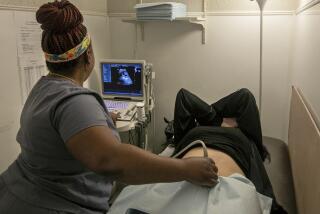Who Should Take Prenatal Pics? : Health: As more doctors perform fetal ultrasound tests in their offices, some questions are being raised about the quality, cost and necessity of such procedures.
- Share via
When Patti was pregnant four years ago, her obstetrician recommended that she have a fetal ultrasound at a nearby radiological center in Newport Beach.
This year, when Patti was expecting her second child and needed another ultrasound, the obstetrician offered the test in his office.
To Patti, the second test was more comfortable and convenient. But, according to some health experts, the practice raises uncomfortable questions:
* Are tests offered in a doctor’s office substandard in quality?
* Was the test necessary?
* Did it cost more than at a radiological center?
Increasingly, these questions are heard as medical experts debate whether many kinds of tests--including electrocardiograms, ultrasound, mammography and X-rays--should be performed in a doctor’s office or in separate, unaffiliated centers.
The issues surrounding fetal ultrasound are particularly complex. They include debates over whether obstetricians are qualified to perform the exams; whether to require accreditation for anyone offering the tests; whether technicians who operate the ultrasound machines should be certified, and whether ultrasound should even be recommended. Moreover, the ethics of physicians “self-referring” patients to the doctors’ own labs has come under increasing fire.
One recent study found that one-third of all facilities performing ultrasound--radiology centers and obstetricians’ offices alike--failed to meet national quality-assurance guidelines. (The test uses sound waves to take a “picture” of the developing baby.)
The study was particularly critical of ultrasound in doctors’ offices, showing that only 48% met quality guidelines, says a co-author of the study, Dr. Howard B. Kessler of U.S. Healthcare, a large health maintenance organization in the East.
“There were errors of interpretation,” says Kessler. “There were shortcomings in the reports. The exams didn’t describe all the fetal anatomy or the mother’s anatomy, such as condition of ovaries. They failed to comment on findings that would have a significant impact on the fetus, such as the condition of the heart or kidneys. And, in 5% of the cases, we found gross errors in interpretation; gross abnormalities were entirely missed.
“I think many ob/gyns have excellent training to do ultrasound,” cautions Kessler, who presented his findings at a recent meeting of the Radiological Society of North America. “But that doesn’t mean that everybody does.”
The study, he says, should alert consumers and doctors that standards need to be enforced wherever ultrasound is offered. The tests have become enormously popular, with about 70% of pregnant women undergoing at least one per pregnancy to determine the fetus’s age and possible problems, as well as the condition of the placenta.
Obstetricians, about two-thirds of whom have ultrasound equipment, defend their commitment to quality guidelines. However, the big question, experts say, is how to ensure that such tests are performed only when necessary, particularly in private offices, where control measures may be less stringent than elsewhere.
“Self-referring” doctors, it has been shown, may order more tests and charge higher fees than their counterparts. In a study also presented at the recent radiological meeting, a Pennsylvania radiologist, Dr. David C. Levin, found that doctors who performed ultrasound in the office charged more than radiologists did.
According to Levin, doctors like to offer certain tests in their offices because they can earn additional money and patients appreciate the convenience.
“There is an obvious financial incentive to it,” says Levin, chairman of the radiology department at Thomas Jefferson University Hospital in Philadelphia. “But this country doesn’t have a good mechanism for putting limitations on what physicians can do. I think that’s a real weakness in our system. It accounts for an awful lot of overutilization and unnecessary diagnostic tests.”
For example, Levin says, his studies of Blue Cross subscribers in Pennsylvania showed that about one-third of fetal ultrasounds were performed in hospitals by radiologists. The other two-thirds were done in private offices, and two-thirds of those were self-referred.
“There is a tremendous amount of self-referral going on,” Levin says.
Radiologists say they do not want to become “territorial” about what tests doctors should be allowed to perform. But many say that accreditation exams and quality-review procedures should be enacted to protect consumers.
Kessler and his colleagues say they are developing a quality assurance program for U.S. Healthcare, but nationwide there are no such programs for facilities providing fetal ultrasounds.
“There are just beginning to be some efforts made to set up standards for the performance of ultrasound,” Levin says. “I think that is an important development. If you set up standards that private offices have to meet, I think that will cut out those that are substandard.”
Kessler and Levin argue that accreditation is necessary because ultrasound requires more training than some obstetricians receive.
Obstetricians argue that the vast majority are fully qualified to perform basic ultrasound.
According to Dr. Richard Buyalos, an assistant professor in the School of Medicine at UCLA, there are two general classifications for ultrasound: One, a “baseline” exam that the majority of pregnant women undergo, looks for things like a multiple pregnancy, the baby’s heartbeat, the location of the placenta and the amount of amniotic fluid. The other, a “targeted” exam, might look for abnormalities.
The American College of Obstetrics and Gynecology sets standards on what obstetricians should know to perform each level competently, says Buyalos.
“I think the general obstetrician who is well-trained should be able to do a baseline scan,” he says.
If they discover something abnormal, most obstetricians would refer the patient to a perinatologist or radiologist for a more detailed exam, Buyalos adds.
Nevertheless, other experts suggest that standardized training would end many controversies. The American Institute of Ultrasound in Medicine has formed a task force of obstetricians and radiologists to create uniform guidelines, due out next year.
“Once those guidelines for training come out and are endorsed by all the official bodies, then it should diminish turf battles about who should perform ultrasound, and it should result in overall better quality,” says Dr. John Hobbins, director of obstetrics at the University of Colorado Health Sciences Center.
Even if standards for training and accreditation become widespread, medical professionals have to be sensitive to the appearance of impropriety when it comes to self-referral, says Dr. Nancy W. Dickey, a member of the American Medical Assn. Board of Trustees.
If a doctor self-refers, she says: “How do you reassure patients that they are getting necessary and high-quality care?”
The question is one AMA members have had trouble agreeing on. According to a highly debated AMA policy, it is unethical for doctors to refer patients to facilities in which they have a financial interest--unless no other facilities offer the service. Performing a test within one’s own office is not prohibited.
“This policy will, hopefully, address the people that abuse the system and reassure patients,” Dickey says.
Meanwhile, women should not fear that their fetal ultrasounds will be routinely mishandled, Kessler says.
But he adds: “Our recommendation is for women to be active consumers. They should demand certain answers from the physician about why he or she is doing the study, how skilled the physician is, and who is interpreting the study. The more women speak up on this issue, the more impetus there will be for the government and physicians to do what is everyone’s best interest, which is to provide optimal care.”






